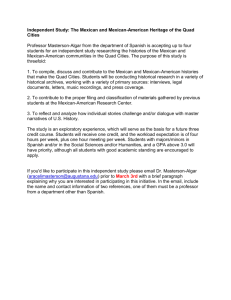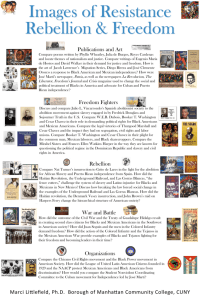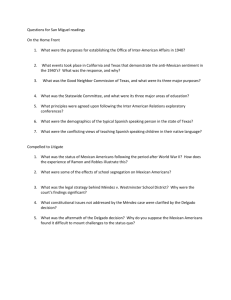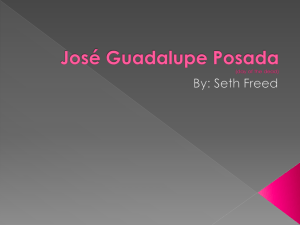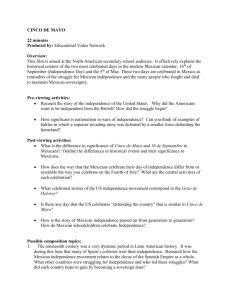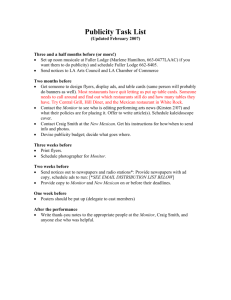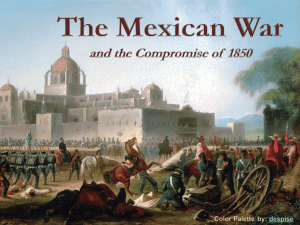View/Open - San Diego State University
advertisement
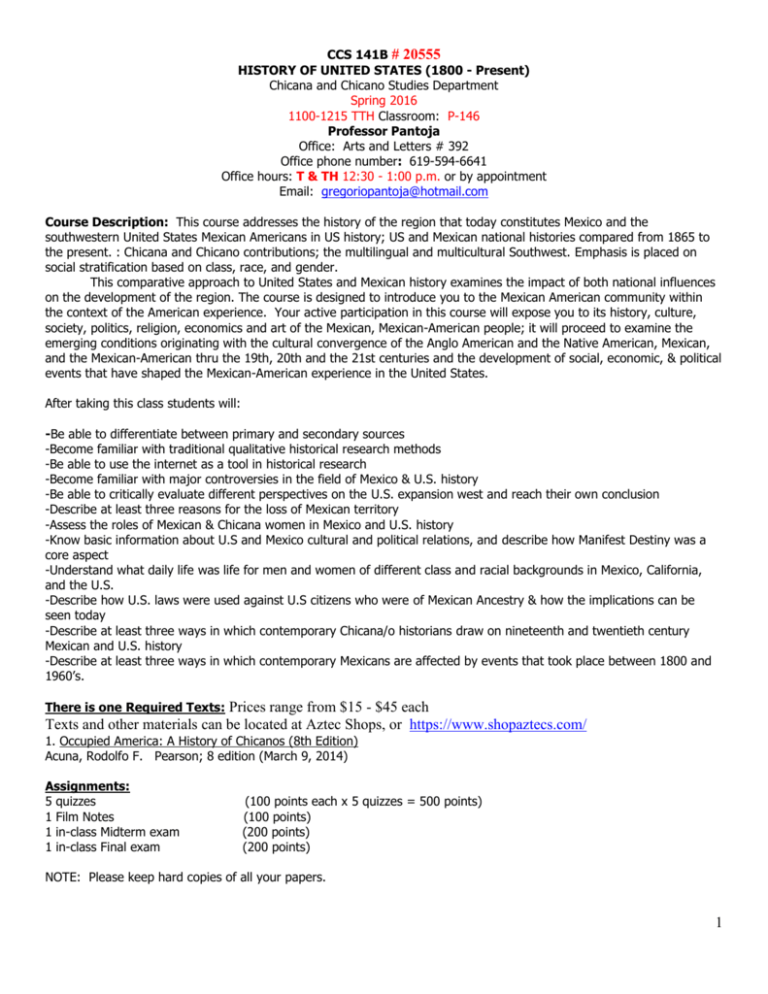
CCS 141B # 20555 HISTORY OF UNITED STATES (1800 - Present) Chicana and Chicano Studies Department Spring 2016 1100-1215 TTH Classroom: P-146 Professor Pantoja Office: Arts and Letters # 392 Office phone number: 619-594-6641 Office hours: T & TH 12:30 - 1:00 p.m. or by appointment Email: gregoriopantoja@hotmail.com Course Description: This course addresses the history of the region that today constitutes Mexico and the southwestern United States Mexican Americans in US history; US and Mexican national histories compared from 1865 to the present. : Chicana and Chicano contributions; the multilingual and multicultural Southwest. Emphasis is placed on social stratification based on class, race, and gender. This comparative approach to United States and Mexican history examines the impact of both national influences on the development of the region. The course is designed to introduce you to the Mexican American community within the context of the American experience. Your active participation in this course will expose you to its history, culture, society, politics, religion, economics and art of the Mexican, Mexican-American people; it will proceed to examine the emerging conditions originating with the cultural convergence of the Anglo American and the Native American, Mexican, and the Mexican-American thru the 19th, 20th and the 21st centuries and the development of social, economic, & political events that have shaped the Mexican-American experience in the United States. After taking this class students will: -Be able to differentiate between primary and secondary sources -Become familiar with traditional qualitative historical research methods -Be able to use the internet as a tool in historical research -Become familiar with major controversies in the field of Mexico & U.S. history -Be able to critically evaluate different perspectives on the U.S. expansion west and reach their own conclusion -Describe at least three reasons for the loss of Mexican territory -Assess the roles of Mexican & Chicana women in Mexico and U.S. history -Know basic information about U.S and Mexico cultural and political relations, and describe how Manifest Destiny was a core aspect -Understand what daily life was life for men and women of different class and racial backgrounds in Mexico, California, and the U.S. -Describe how U.S. laws were used against U.S citizens who were of Mexican Ancestry & how the implications can be seen today -Describe at least three ways in which contemporary Chicana/o historians draw on nineteenth and twentieth century Mexican and U.S. history -Describe at least three ways in which contemporary Mexicans are affected by events that took place between 1800 and 1960’s. There is one Required Texts: Prices range from $15 - $45 each Texts and other materials can be located at Aztec Shops, or https://www.shopaztecs.com/ 1. Occupied America: A History of Chicanos (8th Edition) Acuna, Rodolfo F. Pearson; 8 edition (March 9, 2014) Assignments: 5 quizzes 1 Film Notes 1 in-class Midterm exam 1 in-class Final exam (100 points each x 5 quizzes = 500 points) (100 points) (200 points) (200 points) NOTE: Please keep hard copies of all your papers. 1 Quizzes You will take five multiple choice/ true-false quizzes. Together the quizzes will be worth 50% of your final grade. SCANTRON 815-E Film Notes You will be shown films/documentaries in class during the semester. You are responsible for taking notes during the film, and later writing a reflective/thought essay on the film. In total you will have written 4 pages. At the end of the course I will select one of the films, and you will then turn in your work. How to write the film notes: You are responsible for hand writing at least 2 pages of notes during each film/documentary, and hand writing at least 2 pages summarizing your thoughts & perspectives as homework. You should have a total of 4 pages of 8.5”x 11”paper. Please follow the length guidelines. I WILL TAKE POINTS OFF IF THE ESSAY IS UNDER THE REQUIRED PAGE LENGTH (25 % off for every half page under the pages required in an assignment). Typed or printed notes/essay will lose 50% of points. Exams The Exams will consist of 20 questions with multiple choice answers. The questions will be based on information given in the in class lectures as well as material from your assigned readings covering the first half and second half of the semester. Your exams will be a multiple choice Scantron exam of 20 questions worth 20 points The Midterm Exam represents 20% of the student’s grade. SCANTRON 882-E Grade Calculations: -5 quizzes -Film Notes -Midterm Exam -Final Exam 50% of final grade 10% of final grade 20% of final grade 20% of final grade GRADE CALCULATIONS IN PERCENTAGE FOR EACH ASSIGNMENT: 93-100= A 90-92 = A88-89 = B+ 83-87 = B 80-82 = B78-79 = C+ 73-77 = C 70-72 = C68-69 = D+ 63-67= D 60-62= D59 and below= F FINAL GRADE CALCULATIONS: 930-1000= A 900-929 = A880-899 = B+ 830-879 = B 800-829 = B780-799 = C+ 730-779 = C 700-729 = C680-699 = D+ 630-679= D 600-629= D599 and below= F 2 SDSU Grading Policy: A is for outstanding achievement, available only for the highest accomplishments B is for praiseworthy performance, definitely above average C is average, awarded for satisfactory performance, the most common undergraduate grade D is minimally passing, less than the typical undergraduate achievement F is failing Extra credit There is NO opportunity for extra credit. Plagiarism Plagiarism is unethical and against school policy. Always cite your sources and place the words of others in quotes. Do not turn in the same paper for two different classes. Do not recycle a paper from a previous class (do recycle the paper, just not the words). A plagiarized paper or essay can result in an F for the class. This is the site for the plagiarism tutorial and certificate.https://www.indiana.edu/~istd/definition.html Policy for missed assignments and exams Make up exams and tardy assignments are allowed only in cases of documented emergencies. Please let me know if you are unable to turn in an assignment on time or if you are unable to take an exam on the scheduled date. Americans with Disabilities act/ADA Policy SDSU is committed to providing reasonable accommodations for students with disabilities to permit them to carry out their educational responsibilities. If you need assistance please contact me or call Disabled Student Services at 619 594-6473, TDD 619 594-2929. Syllabus change policy The schedule and procedures in this course are subject to change in the event of extenuating circumstances. Cell phone policy Please turn off (or mute) all cell phones and other electronic equipment during class. Texting policy If you are in dire need of texting, please do so outside the classroom. If I see you texting during class I will ask you to step outside to continue texting. Laptop policy You are more than welcome to use a laptop in class. I do ask that you please refrain from checking email and surfing the internet during class. If I see you on the internet during class I will ask you to give an impromptu presentation to your classmates on the subject you are engaged in. Blackboard The syllabus, PowerPoint presentations, and the exam study guides will all be available on blackboard. http://blackboard.sdsu.edu Email addresses and email messages The best addresses are those that have your first and last name only (not your birth date, your nickname, a physical characteristic, or a special hobby). It is difficult to take unusual email addresses seriously. They are often perceived to be spam and end up in my spam folder. I will make an effort to respond to all emails in a timely manner. If the email is only informational, I might not respond at all (an example is: “I will be late for class on Tuesday”). Do not take that personally. I receive hundreds of work-related emails every week. If I responded to every single email, I would do nothing else all week. If, on the other hand, the information you sent me in the email is important, do make sure you get a response. If you do not get a response, it might mean that I never got your email. 3 Phone messages I do not check the voice messages on my office answering machine. Please do not leave messages on my answering machine. The best way to contact me is through email at gregoriopantoja@hotmail.com Proper office hours etiquette It is commonly understood that students should knock on a professor’s door before entering, whether or not they have an appointment at that specific time. Please also knock on my door (even if the door is open) if you are waiting to see me and I am with another student. If you simply wait silently in the corridor I might never know you are waiting to see me. Graded papers and exams Please make an effort to pick up your graded essays and exams. I will bring them to class twice. If you are not able to pick them up then, do stop by my office hours to pick them up. Attendance I will take attendance every period in an effort to memorize students’ names. Since this class meets only twice a week, missing more than one class in the semester will surely have a negative impact on your grade. Class participation Class participation is very important. Please do the readings and come prepared to participate in the discussions. Student Responsibility Students are responsible for knowing, and being familiar with all of San Diego State Universities’ rules, laws, rights, penalties, fees, & etc. Not having read through all available information does not exempt you from culpability. You can find all of S.D.S.U.’s policies online at, http://www.sdsu.edu/ . Rules of engagement: In our pursuit of serious scholarly inquiry we will engage controversial topics, concepts, methodologies, and insights. It will be our collective responsibility to maintain an intellectually rigorous and respectful environment. Thus, it is imperative that our interaction in class be thoughtful, courteous, and supportive of the views, experiences, and expertise of others at all times. In order to maintain a convivial learning environment we must agree: -to give each person a chance to speak -to listen to the person who is speaking -to speak for oneself and one’s own experiences without dismissing the experiences of those who cannot speak for themselves -not to diminish, ridicule, or attack other participants, even if we disagree with what they said -not to treat others differently based on what was said or discussed in class -not to repeat what someone shares in class discussions outside of class without permission from that person or the group -not to diminish, ridicule, or attack the opinions or experiences of those who are in the United States without government-issued documentation (see below) -----------------------------------------------------------------------------------------------------------The Universal Declaration of Human Rights (Adopted by the United Nations General Assembly in 1948) Article 1. All human beings are born free and equal in dignity... This course does not deal with contemporary issues in the United States. However, the past informs the present, and the present informs our views of the past. At some point during the semester, there could potentially be a discussion on the presence of people living in the U.S. without government-issued documentation. In the spirit of the Universal Declaration of Human Rights, I ask that you avoid referring to people as “illegals” and that we maintain, as a class, the utmost respect for the human dignity of those who seek a better life for their families by doing tasks many of us would rather avoid. Those who harvest our food, take care of our children, our sick, and our elderly, landscape our yards, build our homes, cook the food in the restaurants we eat at, and clean our toilets, usually for very little pay, deserve our respect, not our contempt. We are all humans, born free and equal in dignity… 4 CLASS SCHEDULE: Subject to change pending faculty union strike or other work stoppage this term. Date Topics/Assigned Reading Class Activities/Assignments Week One: Introduction, Chicana/o Identity T 1/19 TH 1/21 Class Introduction Introduction: Syllabus Discuss: Chicana/o Identity & Perspective Week Two: Americas Wars T 1/26 Topic: Mexican American War & Treaty of Guadalupe Lecture: Mexican-American War & Treaty of Guadalupe TH 1/28 Read: Acuna, Rodolfo. Chp10 Mex-Am Communities in the Making: The Depression years Lecture: The Great Depression & Deportations Discuss: American responses to faltering economy, Mexican Nationals & Immigrants Week Three: Americas Wars T 2/2 Read: The American Political Science Review QUIZ: Articles: The American Political Science Review Read: Japanese Internment, Sections World War II Round Up & The Camp Experience TH 2/4 Read: Acuna, Rodolfo. Chp11 World War II: The Betrayal of Promises Discuss: Racial tensions during WWII. Discuss major social & political issues that impacted Mexican Americans in the U.S. Lecture: Sleepy Lagoon Trial & Zoot Suit Discuss: Racial tensions during WWII. Discuss major social & political issues that impacted Mexican Americans in the U.S. Week Four: Struggle & Identity T 2/9 Read: UFW/Chavez sections titled “UFW Chronology” through “Cesar Chavez Bibliography” QUIZ: Articles: : UFW/Chavez sections titled “UFW Chronology” through “Cesar Chavez Bibliography Lecture: Bracero Program Read: Students to find & print second article about Filipino Farm Workers TH 2/11 Read: Acuna, Rodolfo. Chp 12 “Happy Days”: Chicano Communities Under Siege Discuss: UFW, and Cesar Chavez’s peaceful methods of protests, Compare experiences of Mexican and Filipino Farm Workers Lecture: The Struggles in the Fields Discuss: UFW, and Cesar Chavez’s peaceful methods of protests, Compare experiences of Mexican and Filipino Farm Workers 5 Week Five: Struggle & Identity T 2/16 TH 2/18 Read: “Yo soy Joaquin/I am Joaquin” “El Plan Espirtitual de Atzlan” QUIZ: Articles: “Yo soy Joaquin/I am Joaquin” “El Plan Espirtitual de Atzlan” BRING PRINTED COPY OF “Yo soy Joaquin” Lecture: Mexican-American youth, identity, & foundations of a social & political movement Lecture: Quest for a Homeland Discussion: “Yo Soy Joaquin” Week Six: Separate but Equal T 2/23 Read: Ferg-Cadima, James A. Black, White and Brown pgs. 6-27 QUIZ: Articles: Black, White and Brown Lecture: Racial segregation and education TH 2/25 Read: Ferg-Cadima, James A. Black, White and Brown pgs. 6-27 Lecture: Lemon Grove Incident Discuss: Significance of Lemon Grove Incident as an educational movement and victory for Mexican Americans. Week Seven: Separate but Equal T 3/1 Read: Munoz, Carlos. The Militant Challenge. Pgs. 47-72 Discuss:1968 East Los Angeles Student “Blowouts” Discuss: Development of Mex-Am Student Activism, & minorities in higher education. Lecture: Taking Back the Schools TH 3/3 Read: Acuna, Rodolfo. Chp13 Goodbye America: The Chicano in the 1960s Week Eight: Education & Chicana Feminism T 3/8 Research: S.D.S.U. history of student activism past & present: Print Article for Class Discuss: Similarities of Mexican-American student’s issues historically and current/recent issues for S.D.S.U. students; what are the similarities, differences. TH 3/10 Reading: Garcia, Alma M. The Development of Chicana Feminist Discourse Lecture: : Mex-Am women’s experiences in the American society Analyze & Discuss the struggles within The Chicano Movement Week Nine: Gender, Stereotypes, & Mexican American Women T 3/15 Read: Acuna, Rodolfo. Chp14 The 1970s and 1980s: Redefining the 1960s Debate Preparation: Mex-Am women’s independence vs Mex-Am Machismo & traditional values TH Debate Continued Debate: Mex-Am women’s independence vs Mex-Am Machismo & 6 3/17 traditional values Week Ten: MIDTERM T 3/22 Pre Midterm Midterm Exam Review: Office Hours Available by appointment TH 3/24 Midterm MIDTERM EXAM: Exam 20 pts Week Eleven: Cultural Consciousness T 4/5 TH 4/7 Read: Hagedorn, Jessica. Asian Women in Film: No Joy, No Luck pg.32-37 Roman, Ediberto. Who is Exactly Living the Vida Loca? pg.39-48 Read: continued Lecture: Creation of “American” social image & the structure of MexicanAmerican & Anglo-American social classes. Discuss: Narration of cultural & gendered positioning within the American social structure QUIZ: No Joy, No Luck, Who is Exactly Living the Vida Loca? Lecture: Cultural Criticism, and Transformation Discuss: What are cultural norms and stereotypes of Mexican-Americans & minorities in film, T.V. and magazines? Week Twelve: Social Constructs T 4/12 Read: Acuna, Rodolfo. Chp 15 Becoming a National Minority: 1980—2001 Lecture: Social Constructs of a Minority Film: Crash Analyze and Discuss: American Culture & Gender TH 4/14 Read: Acuna, Rodolfo. Chp 15 Becoming a National Minority: 1980—2001 Lecture: Social Constructs of a Minority Film: Crash Analyze and Discuss: Mexican-American Culture and gender Week Thirteen: Seminar Meetings T 4/19 Seminar Meeting Seminar Meeting: Group #1 Discuss: Compare and contrast themes within issues presented. What is the issue? How is it political, social, economic, etc.? Do other minority groups experience these issues? What is a possible solution? DUE: Film Notes TH 4/21 Seminar Meeting Seminar Meeting: Group #2 DUE: Film Notes Week Fourteen: Decade of Struggle and Hope 7 T 4/26 Seminar Meeting Seminar Meeting: Group #3 DUE: Film Notes TH 4/28 Read: Acuna, Rodolfo. Chp 16 Losing Fear: Decade of Struggle and Hope Lecture: Prelude to 9/11 Debate: Positive & negative effects of 9/11 on American Solidarity, and Minorities Week Fifteen: Final Exam Review T 5/3 No Lecture Final Exam Review: Office Hours Available by appointment TH 5/5 No Lecture Final Exam Review: Office Hours Available by appointment Week Sixteen: FINAL EXAM T 5/10 You are responsible for bringing a blue book that has no writing in it for your Final Exam FINAL EXAM IS Tuesday, May 10 1030-1230 8
